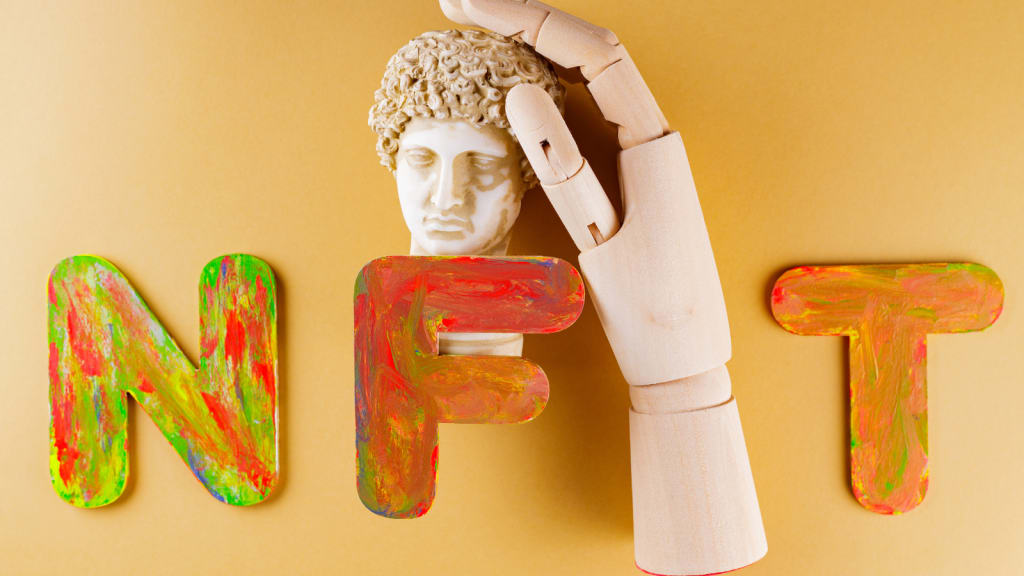Introducing NFT Tokens: The Future of Collectibles
1. NFT tokens are the future of collectibles. 2. They are digital tokens that represent a unique asset. 3. NFT tokens can be used to buy, sell, or trade assets. 4. NFT tokens can be stored on a blockchain. 5. NFT tokens can be used to represent any asset, including digital art, in-game items, and even physical assets. 6. NFT tokens are easy to transfer and manage. 7. NFT tokens are the future of collecting.

Introducing NFT Tokens: The Future of Collectibles
A new type of digital asset has been taking the internet by storm – Non-Fungible Tokens, or NFTs. These unique tokens represent ownership of digital assets, often in the form of art, and can be traded or sold like any other asset. NFTs are powered by blockchain technology, which allows for secure and verifiable transactions.
The popularity of NFTs has been growing rapidly, with major platforms such as NBA Top Shot and Flow becoming household names. This new collectible craze has many people wondering – what is the future of NFTs?
There is no doubt that NFTs are here to stay. Their unique properties make them ideal for collecting and trading, and they are only getting more popular. With the help of blockchain technology, NFTs are well on their way to becoming the future of collecting.
1. NFT tokens are the future of collectibles.
2. They are digital tokens that represent a unique asset.
3. NFT tokens can be used to buy, sell, or trade assets.
4. NFT tokens can be stored on a blockchain.
5. NFT tokens can be used to represent any asset, including digital art, in-game items, and even physical assets.
6. NFT tokens are easy to transfer and manage.
7. NFT tokens are the future of collecting.
1. NFT tokens are the future of collectibles.
NFT tokens are the future of collectibles. They have all the benefits of traditional collector items, like art, while also incorporating the best aspects of cryptocurrency. NFT tokens are digital, so they can be easily traded and stored. They're also immutable, so they can't be counterfeit. And, because they're based on blockchain technology, they're secure and transparent.
Traditional collectibles can be expensive and hard to store and transport. They can also be counterfeit. NFT tokens don't have any of these problems. And, because they're digital, they can be traded instantly and easily.
NFT tokens are the perfect way to collect and trade digital items. They're secure, transparent, and easy to use. And, because they're based on blockchain technology, they're here to stay.
2. They are digital tokens that represent a unique asset.
NFTs, or non-fungible tokens, are a new type of digital asset that are revolutionizing the world of collectibles. Unlike traditional collectibles, NFTs are digital tokens that represent a unique asset. This means that each NFT is completely unique and cannot be replaced by another NFT. This makes NFTs ideal for collecting and trading, as they can be easily stored and transferred online.
NFTs are created using blockchain technology, which allows them to be stored on a secure, decentralized ledger. This makes NFTs much more secure than traditional collectibles, which can be easily lost or stolen. Blockchain also allows NFTs to be easily traded and exchanged peer-to-peer, without the need for a central authority.
The most popular use for NFTs so far has been in the gaming industry. Many popular games, such as Fortnite and CryptoKitties, now allow players to trade and collect NFTs. These NFTs can be used to represent in-game items, such as weapons or skins, or they can be traded for real money.
NFTs are still in their early days, but it is clear that they have the potential to revolutionize the world of collectibles. With their unique features, NFTs are poised to become the new standard for collecting and trading.
3. NFT tokens can be used to buy, sell, or trade assets.
The use of NFT tokens has already been seen in a few areas, the most prominent being in the world of online gaming. In the near future, it is expected that the use of NFT tokens will become much more widespread, as they offer a number of advantages over traditional methods of buying, selling, or trading assets.
For one, NFT tokens can be used to represent ownership of any type of asset, whether it be a digital asset like a piece of digital art, or a physical asset like a piece of jewelry. This makes them ideal for use in a number of different situations. For example, if you wanted to sell your digital art collection, you could do so using NFT tokens. Or, if you wanted to buy a piece of jewelry from someone, you could use NFT tokens to represent the value of the piece, and then trade them for the jewelry itself.
Another advantage of NFT tokens is that they can be easily transferred between different platforms. For example, if you wanted to sell your digital art collection on one platform, but then buy a piece of jewelry on another platform, you could easily transfer the NFT tokens between the two platforms. This flexibility makes NFT tokens ideal for use in a variety of different situations.
Finally, NFT tokens offer a degree of security that is not present with traditional methods of buying, selling, or trading assets. For example, when you buy a piece of digital art using NFT tokens, you can be sure that the art is genuine and that you are the rightful owner. This is because each NFT token is stored on a blockchain, which is a decentralized database that keeps track of all transactions.
In conclusion, NFT tokens are a versatile and convenient way to buy, sell, or trade assets. They offer a number of advantages over traditional methods, and are expected to become much more widely used in the future.
4. NFT tokens can be stored on a blockchain.
It's no secret that cryptocurrencies have taken the world by storm. In the past decade, we've seen the rise of Bitcoin, Ethereum, and other digital currencies that have disrupted traditional financial systems. But what's even more fascinating is the rise of non-fungible tokens, or NFTs.
NFTs are digital assets that are unique and cannot be replicated. They're stored on a blockchain, which is a distributed ledger that offers a secure and transparent way to track ownership and transfer assets.
One of the most popular use cases for NFTs is in the gaming industry. Games such as Cryptokitties and Decentraland have paved the way for a new type of gaming experience that allows players to own and trade virtual assets.
But NFTs are not just for games. They have the potential to change the way we interact with digital content and create new markets for collectibles and art. For instance, savvy investors are already using NFTs to trade digital art and other collectibles.
The possibilities are endless and the potential for NFTs is huge. So, if you're not already familiar with them, now is the time to start paying attention to this exciting new technology.
5. NFT tokens can be used to represent any asset, including digital art, in-game items, and even physical assets.
NFT tokens are digital assets that can represent anything from digital art to in-game items and even physical assets. By using NFT tokens, collectors can easily track, manage, and trade their collections.
NFT tokens have many advantages over traditional collectibles. For one, NFT tokens are easily divisible, so collectors can trade fractions of assets if they so desire. NFT tokens also provide collectors with more flexibility when it comes to where and how they store their assets. Collectors can store their NFT tokens on decentralized exchanges, which allows them to trade their assets without having to rely on a centralized third party.
Another advantage of NFT tokens is that they can be used to represent a wide variety of assets. For example, NFT tokens can be used to represent digital art, in-game items, and even physical assets. This means that collectors can use NFT tokens to trade a wide variety of assets.
Finally, NFT tokens are much easier to trade than traditional collectibles. This is because NFT tokens can be traded on decentralized exchanges, which allow for 24/7 trading.
6. NFT tokens are easy to transfer and manage.
NFTs, or non-fungible tokens, are digital assets that are unique and cannot be replaced. They are often used to represent items such as digital art, collectibles, and in-game items.
NFTs are easy to transfer and manage. For example, if you own a digital art piece that is an NFT, you can easily transfer it to someone else by sending them the file. NFTs can also be stored in online wallets, making it easy to keep track of your collection.
The benefits of NFTs over traditional collectibles is that they can be easily traded and sold online, and they are not subject to the same wear-and-tear. Furthermore, NFTs can be divided into smaller units, so you can trade or sell part of your collection without having to give up the entire thing.
The future of NFTs is very exciting. With the rise of blockchain technology, we are seeing more and more creative uses for NFTs. For example, we are seeing the development of NFTs that can be used to represent physical objects, such as cars or houses. We are also seeing the development of platforms that allow users to create and trade their own NFTs.
The possibilities for NFTs are endless, and we are only just beginning to scratch the surface of what they can do. In the future, we will see even more innovative and exciting uses for NFTs.
7. NFT tokens are the future of collecting.
The current state of the collecting world is a bit of a mixed bag. On one hand, you have traditional collectors who focus on physical objects like coins, stamps, and sports memorabilia. On the other hand, you have digital collectors who focus on digital assets like video game characters and in-game items.
What both of these groups have in common is that they're both interested in owning rare and unique items. However, there's a big difference between physical and digital collectibles. Physical collectibles are limited by their physical existence - there can only be so many of them in the world. Digital collectibles, on the other hand, can be duplicated infinitely.
This is where NFT tokens come in. NFT tokens are digital collectibles that are stored on the blockchain. This means that they can't be duplicated, and each one is totally unique.
NFT tokens are the future of collecting because they combine the best of both worlds: the rarity and uniqueness of physical collectibles with the infinite duplicability of digital collectibles. With NFT tokens, anyone can own a rare and unique item that can be stored safely on the blockchain.
Introducing NFT tokens is a game-changer for the collectibles industry. For the first time, collectors can easily and securely buy, sell, and trade their collectibles using blockchain technology. NFT tokens are immutable, meaning they cannot be replicated or tampered with, which makes them the perfect way to store and transfer value for collectors. With NFT tokens, the collectibles industry is on the cusp of a new era of growth and excitement.
About the Creator
Jennifer Defalco
An NFT, or non-fungible token, is a digital asset that represents ownership of a unique item or asset. NFTs are stored on a blockchain.






Comments
There are no comments for this story
Be the first to respond and start the conversation.